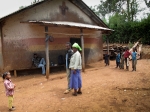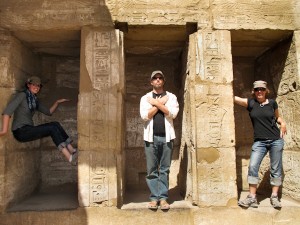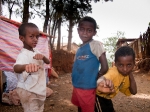 Mark Twain delights us with the wonders of boyhood. Skinned knees and bare feet, wild with imagination and thirst for adventure. Jirata, Dameka, and Lalise would fit brilliantly into these pages. I can see these three scamps racing the red clay roads to the staduim on Saturday mornings to watch futbol, striking taekwondo poses, and nabbing mangoes along the way. Later, they’d hang out by the foosball tables on the side of the tarmac, a road that cuts thru Gimbie on it’s way to Addis Ababa or Sudan, depending on your direction. It was by these tables on my walks home that they adopted me, taking turns teaching and quizzing me on Amharic, or Oromifa. I could never tell which was which.
Mark Twain delights us with the wonders of boyhood. Skinned knees and bare feet, wild with imagination and thirst for adventure. Jirata, Dameka, and Lalise would fit brilliantly into these pages. I can see these three scamps racing the red clay roads to the staduim on Saturday mornings to watch futbol, striking taekwondo poses, and nabbing mangoes along the way. Later, they’d hang out by the foosball tables on the side of the tarmac, a road that cuts thru Gimbie on it’s way to Addis Ababa or Sudan, depending on your direction. It was by these tables on my walks home that they adopted me, taking turns teaching and quizzing me on Amharic, or Oromifa. I could never tell which was which.
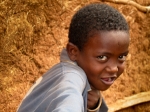 These boys are like all little boys and they’ll steal your heart and take your hand. Except they have no hands to guide them, they are on their own. These are the street boys, living together as a family, sleeping under trucks and in doorways, begging or charming their dinners from the townspeople and restaurants.
These boys are like all little boys and they’ll steal your heart and take your hand. Except they have no hands to guide them, they are on their own. These are the street boys, living together as a family, sleeping under trucks and in doorways, begging or charming their dinners from the townspeople and restaurants.
One little urchin with lazy eyes and a peaceful smile followed us into a restaurant for dinner. We were with our friend Mark and by the time we washed and sat down, David was sitting right beside us, beaming. I thought he was with you, oh, I thought he was with you. He sat patient, a perfect little gentleman and the clever little guy won us over. When the communal plate of injera came we bought him a soda and feasted. After the meal, clutching his prized soda, he rocked with lightness of laughter as Darlene mimicked an exploding belly.
I had already been working with the street boys for a couple weeks when we came upon Jirata, exhausted and sitting on the curb, in front of his favorite mango stand. I saw his tiny figure rise and turn to us with his signature stare, bloodshot eyes, and exhausted posture. Darlene, who’d never met him, recognized him instantly from my photos. His anticipation was overwhelming and his tiny hand found mine. I knelt to bump shoulders, as is the ethiopian greeting, and took the whole of his filth, from head to toe, into a warm embrace. I have never seen dirtier children.
Everyone had been looking for him, the boys told us he was sick and skipping school. Only nine years old, he’s HIV positive and both parents have been taken by the disease. He has no one looking after him aside from his best friends, who during previous hospital stays held vigil by his side.
No words were exchanged and his grip tightened and we walked to the hospital. This attracted attention. Ethiopians are not accustomed to foreigners embracing filthy street kids, let alone walking off with them. He could barely eat and he was so dehydrated his lips were sore. He managed half a banana and held a mango for later. He was admitted to the hospital.
The next morning, I set out to visit him. A little girl living on the hospital grounds knew where his bed was and brought me into the ward to see him. I had drawn a little cartoon on a makeshift card, but when we arrived, his bed was empty. The nurse said he woke, pulled out his IV, and left.
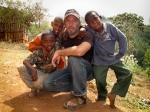
A few days earlier, I happened upon a crowd gathered on the curb not far from the hospital. Two of the boys were in the middle so I pushed my way in and found another boy lying on the ground. I’d never seen him before, but he was wearing one of the yellow t-shirts that were given to a handful of the boys six months earlier. One man spoke broken english so I grabbed Moti by the shoulder and pulled him over to relay the story. The man translated, but would never have considered asking Moti himself. The crowd dispersed but the boys remained together, I know they would not have left him alone. I picked him up and carried him to the hospital. Half way he insisted on walking, though he had to hold me with all his might, his strength all but gone. In the emergency room I found a nurse and they laid him down to rest. I learned later that he was epileptic and had had a seizure. He was discharged that afternoon and I never saw him again. The Children’s Medical Fund paid the bill.
Today, Jirata and four other boys are living in a small rented house in Gimbie. A program called the Street Boys pays for the accommodation. A sister project, The Ark, offers economic opportunity for unwed mothers and employed one of them to live in the house and watch the boys.
I created the following video about the Children’s Medical Fund, which provides health care for children in need under the age of eighteen, including the Street Boys.
[smooth=id:32]

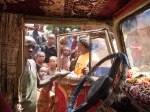
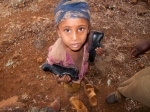
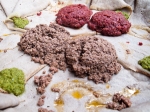
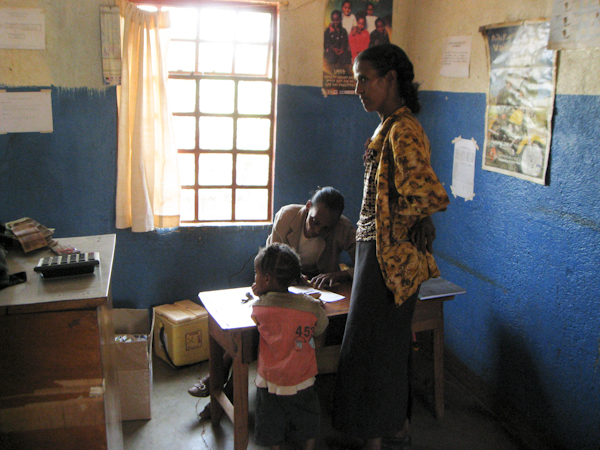 Loaded with drugs, dental tools, used reading glasses and medical supplies, the Land Cruiser sat idle as ten Ethiopians, Americans and a Britt wedged their bodies into the vehicle, vying for cramped space.
Loaded with drugs, dental tools, used reading glasses and medical supplies, the Land Cruiser sat idle as ten Ethiopians, Americans and a Britt wedged their bodies into the vehicle, vying for cramped space.